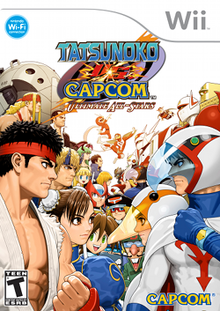| Tatsunoko vs. Capcom: Ultimate All-Stars | |
|---|---|
 North American box art depicting the Capcom and Tatsunoko characters on the left and right, respectively | |
| Developer(s) | Eighting |
| Publisher(s) | Capcom |
| Director(s) | Hidetoshi Ishizawa Shinji Ueda |
| Producer(s) | Ryota Niitsuma |
| Series | Vs. |
| Platform(s) | Arcade, Wii |
| Release | |
| Genre(s) | Fighting |
| Mode(s) | Single-player, multiplayer |
| Arcade system | Proprietary Wii-based arcade board |
Tatsunoko vs. Capcom: Ultimate All-Stars is a crossover fighting game developed by Eighting and published by Capcom. The game features characters from both Capcom's video game franchises and various anime series produced by Tatsunoko Production. It was originally released in Japan for arcades and the Wii video game console in December 2008 as Tatsunoko vs. Capcom: Cross Generation of Heroes (タツノコ VS. CAPCOM CROSS GENERATION OF HEROES). Following high demand from international fans, Capcom worked with Tatsunoko to resolve international licensing issues and a second version, Ultimate All-Stars, was released for the Wii in North America, Japan, and Europe in January 2010, featuring additional characters and online multiplayer.
In Tatsunoko vs. Capcom, players engage in combat with a team of two characters or with a single giant character and attempt to knock out their opponents. It is the seventh Capcom-designed installment in their Vs. fighting game series, which includes the Marvel vs. Capcom and Capcom vs. SNK series, and the first to be fully rendered in 3D graphics. The game is set in a 2.5D environment; characters fight in a two-dimensional arena, but character models and backgrounds are rendered in three-dimensional graphics. The game is designed around a simplified three-button attack system, which was inspired by the simplistic control schemes commonly used by both the Vs. series and the Wii.
The game received generally positive reviews from critics, who praised its approachable gameplay for newcomers and depth for veteran players. However, reviewers had mixed experiences with its online component, and found Arcade mode lacking in replay value. According to the game's producer, Ryota Niitsuma, development difficulties and a lack of Wii fighting games were the reasons for its platform exclusivity; however, multiple critics questioned if that was the best choice. Capcom announced in April 2010 that the game was a commercial success.